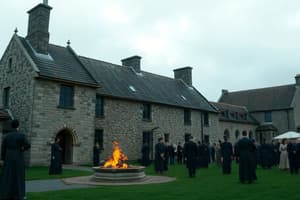Podcast
Questions and Answers
What is the approximate time when the earliest known inhabitants of Ireland, the Mesolithic hunter-gatherers, arrived?
What is the approximate time when the earliest known inhabitants of Ireland, the Mesolithic hunter-gatherers, arrived?
- 1000 AD
- 8000 BC (correct)
- 500 BC
- 1500 AD
What is the Celtic festival that later influenced the modern-day celebration of?
What is the Celtic festival that later influenced the modern-day celebration of?
- Easter
- St. Patrick's Day
- Christmas
- Halloween (correct)
What is the national language of the Republic of Ireland?
What is the national language of the Republic of Ireland?
- Gaelic
- Celtic
- Irish (correct)
- English
What is the estimated number of native speakers of Irish?
What is the estimated number of native speakers of Irish?
What is the name of the three-leafed plant that is the national symbol of Ireland?
What is the name of the three-leafed plant that is the national symbol of Ireland?
What is the main reason for the dispersion of Irish people from Ireland?
What is the main reason for the dispersion of Irish people from Ireland?
Flashcards are hidden until you start studying
Study Notes
Origins and History
- The Irish people originated from the island of Ireland, located in the North Atlantic.
- The earliest known inhabitants of Ireland were the Mesolithic hunter-gatherers, who arrived around 8000 BC.
- The Celts arrived in Ireland around 500 BC and established the Gaelic culture, which would shape Irish identity.
Language
- The Irish language, also known as Irish Gaelic or Gaeilge, is a Celtic language still spoken in Ireland.
- Irish is the national language and the first language of the Republic of Ireland.
- There are approximately 70,000 native speakers of Irish, with many more learning it as a second language.
Culture
- Irish culture is known for its rich heritage of music, dance, and storytelling.
- Traditional Irish instruments include the fiddle, bodhran, and uilleann pipes.
- The Celtic festival of Samhain, later influenced by Christianity, is the origins of modern-day Halloween.
Symbols
- The shamrock, a three-leafed plant, is the national symbol of Ireland and represents the Holy Trinity.
- The Celtic cross, a symbol of Christianity, is a prominent feature of Irish art and architecture.
- The harp, a traditional Irish instrument, is also a symbol of Ireland and appears on the country's coat of arms.
Diaspora
- The Irish diaspora refers to the dispersion of Irish people from Ireland, primarily due to the Irish Potato Famine (1845-1852) and economic instability.
- Estimated 70-80 million people worldwide claim Irish ancestry, with significant populations in the US, UK, Canada, and Australia.
- The Irish diaspora has had a significant impact on the development of many countries, particularly in the fields of politics, literature, and music.
Origins and History
- The Irish people originated from the island of Ireland, located in the North Atlantic.
- The earliest known inhabitants of Ireland were the Mesolithic hunter-gatherers, who arrived around 8000 BC.
- The Celts arrived in Ireland around 500 BC and established the Gaelic culture, which shaped Irish identity.
Language
- Irish, also known as Irish Gaelic or Gaeilge, is a Celtic language still spoken in Ireland.
- Irish is the national language and the first language of the Republic of Ireland.
- There are approximately 70,000 native speakers of Irish, with many more learning it as a second language.
Culture
- Irish culture is known for its rich heritage of music, dance, and storytelling.
- Traditional Irish instruments include the fiddle, bodhran, and uilleann pipes.
- The Celtic festival of Samhain, later influenced by Christianity, is the origins of modern-day Halloween.
Symbols
- The shamrock, a three-leafed plant, is the national symbol of Ireland and represents the Holy Trinity.
- The Celtic cross, a symbol of Christianity, is a prominent feature of Irish art and architecture.
- The harp, a traditional Irish instrument, is also a symbol of Ireland and appears on the country's coat of arms.
Diaspora
- The Irish diaspora refers to the dispersion of Irish people from Ireland, primarily due to the Irish Potato Famine (1845-1852) and economic instability.
- Estimated 70-80 million people worldwide claim Irish ancestry, with significant populations in the US, UK, Canada, and Australia.
- The Irish diaspora has had a significant impact on the development of many countries, particularly in the fields of politics, literature, and music.
Studying That Suits You
Use AI to generate personalized quizzes and flashcards to suit your learning preferences.




